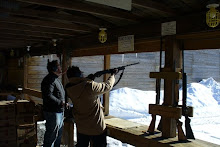As kids they find success, as teens the magic wears off. As young adults they finally consummate the relationship, mostly, she'll remember later, out of boredom. We did it, we did it, we did it yeah takes on new meaning.
The salad days don't last, the spark disappears. The Animal Rescue Center needs a fresh coat of paint that no one will provide.
So too for their hearts. The thrill of the rescue stops being enough, maybe it never was. Dora breaks first, falling into alcohol, weed, heroin, coke, crack, meth. Diego resists but as always he follows her lead. Boots too, and he falls into it worst of all, insatiable. The boots get pawned, and finally the sad little monkey ODs. Not on any one chemical, of course, but rather like his mind and little monkey body stretching in different directions until something breaks. Hardened, Diego throws him out with the trash.
There's the problem of Swiper. He keeps stealing their stash and one morning they ambush him. Dora urges the killing blow. Diego flinches. They let him go with a warning, after which she blackens Diego's eye. Both eyes. The general effect of animal husbandry diminishes: Mother maned wolves nervously shield their cubs, river otters impart to their children never to trust the shifty-eyed pair from up on the hill. Prickers and thorns become a much more bearable alternative. They catch Swiper again, this time sure they'll never be able to trust him. He's still alive when they cinch the trash bag, and all that night neither of them can sleep, sure he's still hanging on, whispering 'oh man' out in the dumpster.
High, high, plenty high. On good days there's enough to go around. On bad days they bicker and fight. One night after a double-stabbing they decide to split. Diego takes up with a couple of porn stars, becomes a kept man. Dora becomes a poacher outright. Ivory. Sharks fins for soup. Maybe jealous, maybe pragmatic, she takes Diego out, throwing him alive into a vat of corrosive acid. The bones are enough to fill two trash bags. Instead she builds a xylophone, carefully aligned from small to big. Resonant. Beautiful.
Time passes. Dora has a change of heart, cleans up her act. Now she's got a desk job, something in project management. The work has a numbing effect (more maybe than the drugs ever could) and it gives her an excuse to go every weekday to the 41st floor of a Madison Avenue skyscraper. In the winters the sunsets are heartbreaking.
The xylophone collects dust in public storage. Dora gains weight, nothing much that you'd notice. A few pounds attributable to contentment.
3.13.2011
3.06.2011
imagined starlight
On the UWS there's a Children's Museum, which today felt a little shabby, which today seemed more like three floors of rent and $10 times x visitors a month. They'd closed off the third floor for some kid's birthday party and there must have been 150 kids crammed into the other two floors. Dora and Boots and Diego still smiled but they all looked a little exhausted, there on the walls, putting exuberant Spanish-lite to kid after kid after kid. They must have felt like they were phoning it in. Al rescate sounds so sad when it's only mumbled, when it channels only the vocal cords and no heart.
Hung back and watched N. playing with other kids with these giant blocks and sometimes in the interactions of kids you see it all: How one can ignore the vision of another to fulfill her or his own. How one kid's block tower is another kids raw materials, all in quick time.
How every New York neighborhood is always at least three at once, the one it was, the one it is, the one it's on its way to becoming. How empires are the same, built from those of the past, then picked coldly for the best scraps to form new ones.
The joy of that metaphor being that today my kid was a little emperor, building a tower for the ages, beneficent, the best ruler this town has ever seen, with trumpets and saxophones and drums and bass and guitar to herald a new reign, redolent with young joy, a kingdom bound felicitous under imagined starlight.
Hung back and watched N. playing with other kids with these giant blocks and sometimes in the interactions of kids you see it all: How one can ignore the vision of another to fulfill her or his own. How one kid's block tower is another kids raw materials, all in quick time.
How every New York neighborhood is always at least three at once, the one it was, the one it is, the one it's on its way to becoming. How empires are the same, built from those of the past, then picked coldly for the best scraps to form new ones.
The joy of that metaphor being that today my kid was a little emperor, building a tower for the ages, beneficent, the best ruler this town has ever seen, with trumpets and saxophones and drums and bass and guitar to herald a new reign, redolent with young joy, a kingdom bound felicitous under imagined starlight.
Subscribe to:
Posts (Atom)
